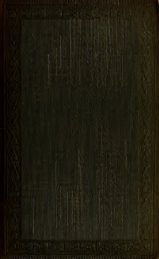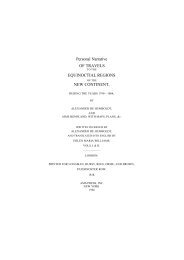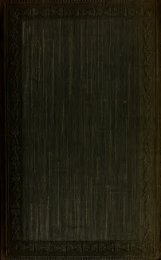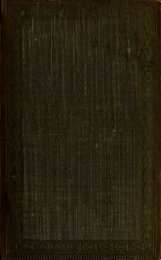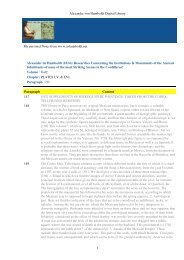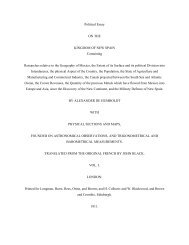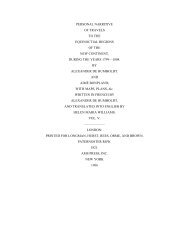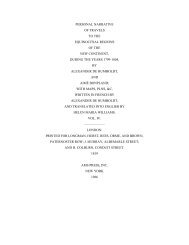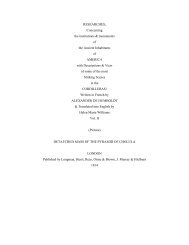See the complete document here
See the complete document here
See the complete document here
You also want an ePaper? Increase the reach of your titles
YUMPU automatically turns print PDFs into web optimized ePapers that Google loves.
88 cozmwi.<br />
Oil account of <strong>the</strong> renown aUa( bed from ancient tiuies te<br />
<strong>the</strong> spot,<br />
I would not omit to mention <strong>the</strong> description of <strong>the</strong><br />
wooded valley of Tempe, as given by ^lian,* probably in imitation<br />
of some earlier notice by Dicsearchus. It is <strong>the</strong> most<br />
detailed description<br />
of natural scenery by any of <strong>the</strong> Greek<br />
prose writers that we possess<br />
; and, although topographical<br />
it is also picturesque, for <strong>the</strong> shady vale is animated by <strong>the</strong><br />
Pythian procession {thtoria), " which breaks from <strong>the</strong> sacred<br />
laurel <strong>the</strong> atoning bough." In <strong>the</strong> later Byzantine epoch,<br />
about <strong>the</strong> close of <strong>the</strong> fourth century, we meet more frequently<br />
with descriptions of scenery interwoven in. <strong>the</strong> romances of <strong>the</strong><br />
Greek pro?e writers, as is especially manifested in <strong>the</strong> pastoral<br />
romance of Longus,t in which, however, <strong>the</strong> tender scenes<br />
taken from life greatly excel <strong>the</strong> expression of <strong>the</strong> sensations<br />
awakened by <strong>the</strong> aspect of nature.<br />
It is not my object in <strong>the</strong> present work to extend <strong>the</strong>se ref<br />
erences beyond what my own special recollection of particular<br />
forms of art m,ay enable me to add to <strong>the</strong>se general consider-<br />
ations of <strong>the</strong> poetic conception of <strong>the</strong> external world. I should<br />
<strong>here</strong> quit <strong>the</strong> flowery circle of Grecian antiquity, if, in a work<br />
to which I have ventured to prefix <strong>the</strong> title of Cosmos, I could<br />
pass over in silence <strong>the</strong> description of nature with which <strong>the</strong><br />
pseudo-Aristotelian book of Cosmos, or Order of <strong>the</strong> Universe,<br />
begins. It describes " <strong>the</strong> earth as adorned with luxuriant<br />
vegetation, copiously watered, and (as <strong>the</strong> most admirable of<br />
all) inhabited by thinking beings. "$ The rhetorical color of<br />
this rich picture of nature, so totally unlike <strong>the</strong> concise and<br />
purely scientific mode of treatment characteristic of <strong>the</strong> Stagirite,<br />
is one of <strong>the</strong> many indications by which it has been<br />
judged that this work on <strong>the</strong> Cosjnos is not his composition.<br />
It may, in fact, be <strong>the</strong> production of Apuleius,^ or of Chrysip-<br />
* JEliani Var. Hist, el Fragm., lib. iii., cap. 1, p. 139, Ktibn. Compare<br />
A. Buttmanu, Qucest. de DiccearcJio (Naumb., 1832, p. 32), and<br />
Geogr. Gr. Min., ed. Gail, vol. ii., p. 140-145 We observe in tbe tragic<br />
poet Chaeremon a remai'kable love of nature, and especially a predilection<br />
for flow^ers, which' has been compared by Sir William Jones to <strong>the</strong><br />
sentiments evinced in <strong>the</strong> Indian poets. <strong>See</strong> Welcker, Gi'iechische Tragodien,<br />
abth. iii., s. 1088t<br />
Longi Pastoralia {Daphnis et Chloe, ed. Seiler, 1843), lib. i., 9;<br />
iii., 12, and iv., 1-3; p. 92, 125, 137. Compare Villemaine, Surles Ro<br />
mans Grecs, in his Melanges de LilUrature, t. ii., p. 435-448, wlieir.<br />
Longus is compared with Bernardin de St. Pierre.<br />
\ Pseud )-Aristot., de Mundo, cap. 3, 14-20, p. 392, Bekker.<br />
^ <strong>See</strong> Stahr, Aristoteles bei den Rdmern, 1834, s. 173-177. O^riiin,<br />
Deilrdge znr Griech. und Rom. Litteratiirgcschichte, bd. i., 1835, s. JG5lyj.<br />
Stahr (s. 172) supposes, like Heunaa'in, that <strong>the</strong> present Greek u



